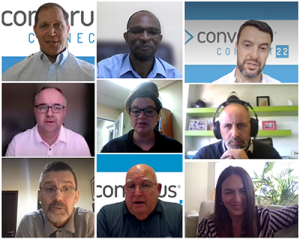CONNECT’22 Conference Unveils True Future of Lie Detection Industry
More than 200 registered for Converus’ annual conference, now in its 8th year, to learn more about the most advanced credibility assessment technologies available today.

During Converus CONNECT’22, EyeDetect customers shared with attendees their experience using the technology for screening and investigations. More than 200 registered for the event that featured the latest advancements in the lie detection industry.
LEHI, Utah – April 29, 2022 – By 2014, very little had changed in the lie detection industry. Polygraph, originally an analog device and then computerized in 1991, had been the de facto lie detector since 1921. After the release of EyeDetect by Converus eight years ago, the method for exposing lies and validating truth has drastically changed. These changes were discussed and demonstrated during the Converus CONNECT’22 virtual conference April 26-28.
More than 200 registered for this annual event — now in its 8th year and one of the premier events for the credibility assessment industry — representing 137 different organizations from 40 countries.
“Since shipping our first EyeDetect system in May 2014, we’ve watched adoption increase year after year. We have more than 600 customers worldwide,” said Converus President and CEO Todd Mickelsen.
The Keynote Address
Mickelsen began his keynote sharing EyeDetect’s origins. After Drs. John Kircher and colleague Doug Hacker wondered if it were possible to detect deception from the eyes, they and a team of three additional scientists at the University of Utah began their 10-year journey in 2003 on a ocular-motor lie detector. In 2013, with the science of this new deception detection solution fully validated, Mickelsen was brought on board to build and take to market a commercial product based on the science.
“I was even more intrigued when I learned two members of this science team, Drs. John Kircher and David Raskin, had spent more than 40 years researching deception detection and co-invented the first computerized polygraph in 1991,” recounted Mickelsen.
Kircher and Raskin identified and created more effective testing protocols and methods to achieve greater reliability and results. Plus, Kircher created the first algorithm for scoring polygraph exams.
This impressive foundation, says Mickelsen, has fueled EyeDetect’s growing popularity. Converus now has six screening and diagnostic testing protocols, with accuracies ranging from 86 to 91%.
Clarifying the EyeDetect and Polygraph Relationship
Mickelsen clarified to attendees the relationship between polygraph and EyeDetect, which has often been misunderstood by the polygraph community. He said Converus’ initial goal was simply to provide a better tool for screening.
“When EyeDetect is added as a pre-screening tool in the hiring process, organizations can significantly reduce the time and costs associated with hiring good candidates by eliminating those with disqualifying activities before committing additional resources to a background check, interview, medical exam, and polygraph test,” said Mickelsen. “If they pass an EyeDetect test, organizations can continue using polygraph exams as an additional vetting method — if they choose or are required to.”
Mickelsen gave an example of the potential savings. If a police dept. has 100 candidates and up to 35% fail the polygraph exam, adding EyeDetect as a pre-screening step could save approximately $60,400.
Mickelsen concluded his remarks announcing EyeDetect now supports exporting EyeDetect+ exam (HDLC and HMCT) polygraph channel data to NCCA_ASCII for import into other polygraph software such as Lafayette or Stoeling. Once imported, test data can be viewed, analyzed and scored manually, similarly to other polygraph exams of different types.
The remainder of the first day featured Converus Chief Scientist John Kircher giving an in-depth review of EyeDetect research, followed by Converus Chief Services Officer Mark Handler and Mickelsen giving product demos. The day concluded with a Q&A panel discussion.
EyeDetect Customers’ Experience
Day two featured 13 EyeDetect customers sharing their experience using the technology. Rohan Traille, a warrant officer with the Jamaica Defence Force (JDF), said the rapid growth of his organization surpassed the screening capabilities of their team of polygraph examiners. Since implementing EyeDetect in 2018, JDF has conducted 7,550 EyeDetect exams compared to 1,458 polygraph tests. Traille said EyeDetect also reduced the number of cases where countermeasures are attempted.
“With EyeDetect, persons employing countermeasures were easily identified,” said Traille.
“When I first heard about EyeDetect, I was hooked,” said Terry Mullins of U.K.-based Integrity Assured and one of his country’s first trained polygraph examiners. “I was looking for another lie detection technology that couldn’t be bribed and wasn’t invasive. We now have quite a few clients in the U.K. that are using EyeDetect.”
Provincia ART, a risk coverage insurance company in Argentina, uses EyeDetect for screening customers who are suspected of filing fraudulent insurance claims. According to Provincia ART Head of Innovation Tómas Posse, “EyeDetect is the perfect tool for insurance fraud prevention.”
Day three was EyeDetect technical training reserved for authorized Converus Service Partners, which currently number over 140 worldwide.
For more information about EyeDetect+,, visit: converus.com
# # #
About Converus®
Converus provides scientifically validated credibility assessment technologies. EyeDetect®, which detects deception by measuring involuntary eye behavior, is a fast, accurate, affordable, noncontact, scalable, and fully automated option to polygraph. EyeDetect+ is the world’s first automated polygraph, making the testing process impartial, accurate, and less intrusive (than a traditional polygraph). It assesses credibility by monitoring and recording ocular activity plus physiological activity similar to a traditional polygraph. Customers worldwide use the EyeDetect product line for screening and investigations to help protect countries, corporations and communities from corruption, crime and threats. Converus is headquartered in Lehi, Utah, USA. Visit: converus.com
_____________________________________________
Converus Press Contact: Jeff Pizzino, APR /+1 480-606-8292

